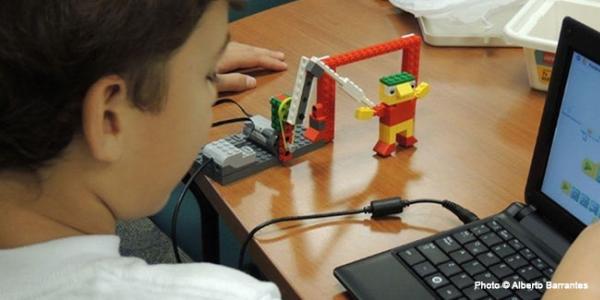Using Technology to Make Reading an Enjoyable Experience for All Children

I learned the importance of doing more than just watching and describing realities while reporting on early childhood education in my home country for La Nación.
In Costa Rica, 60 percent of infants through 6-year-olds live in poor or vulnerable households (Ross, 2013). In 2014, we at La Nación found that at least 22,500 children between 5 and 6 years old were out of school, accounting for 16 percent of all children who miss preschool (Barrantes, 2015). The latest report from the State of the Nation Program (2005) notes that most of the children who do not attend preschool live in rural areas and in the slums of the metropolitan areas. The report also notes that fewer than 40 percent of children from the nation’s poorest families attend preschool. For me, reporting about early childhood education in Costa Rica became about generating progressive strategies between public and private institutions to expand access to high-quality education for all children.
Research shows that children from low-income homes can have better outcomes in life if they receive high-quality preschool experiences. Early learning is critical for developing cognitive language skills and for interpersonal and socio-emotional development. That knowledge and our country’s need led me to start LUDO project, a multimedia project that publishes children’s stories through tablets and cellphones to motivate reading skills during early childhood. If children love using technology to watch videos and play games, I don’t believe we should fight it; instead, we must offer them high-quality technological materials that make learning enjoyable. Realizing that Costa Rica was unable to produce such materials for all children, we saw the opportunity to create these tools and expand their access to our most vulnerable populations.
Technology, when used well, can motivate children’s curiosity, sense of exploration, and interest in solving problems. In addition—as affirmed in the NAEYC position statement “Technology and Interactive Media as Tools in Early Childhood Programs Serving Children From Birth Through Age 8” (2012)—technology can empower children by enabling them to design and manage dynamic concepts that in the past were out of reach, promote changes in their learning strategies, and allow for new ways of social interaction. And while we should discourage passive and non-interactive uses, we should also maximize this opportunity to develop new teaching strategies. Reading, for example, can be taught through games, rhymes, and songs—through fun—and digital storytelling is just another avenue of delivery.
Our purpose with LUDO is to expand and support the use of technological materials in schools, especially where children have fewer opportunities at home. Once children have their first contact with books, the transition to school will be less difficult. But the worst mistake is when the child is bored in the classroom; books and stories must be funny. Games and songs—with letters, syllables, and the building blocks of literacy—can facilitate the development of strong communication and literacy skills.
This kind of technology must go to the homes and schools of the poorest families, and it is necessary to involve parents. If we want to get successful outcomes from early childhood education, we must help parents to become active agents in their children’s development. Responsive interactions between adults and children are essential to early brain development and to cognitive, social, emotional, physical, and linguistic development, and technology can be included those interactions. The great challenge we have is to involve children, teachers, parents, the media, universities, and investigators. We must clearly communicate our goals and involve parents and government authorities in a process that’s main purpose is to create better opportunities for all.
As Benjamin Franklin said, “Tell me and I forget, teach me and I may remember, involve me and I learn.” As global perspectives tell us, the field of early childhood education has seen tremendous changes in recent years, but we have to keep going to make our goals possible. Reality can be changed only when we move from paper to actions, and focus on developing better strategies for expanding access to high-quality early learning. It is only through this development that we will be able to reduce poverty and increase opportunities for all children, resulting in a more developed country and a more developed world.
References
Barrantes, Alberto C. “22.500 Niños Llegan Con Rezago a La Escuela Por Falta De Preescolar.” La Nación, January 19, 2015.
National Association for the Education of Young Children, The Fred Rogers Center for Early Learning, and Children’s Media at Saint Vincent College. 2012. “Technology and Interactive Media as Tools in Early Childhood Programs Serving Children From Birth Through Age 8.” Position statement. Washington, DC: NAEYC.
Programa Estado de la Nación. 2005. “Panorama General De La Infancia En Costa Rica: Segregación Residencial Socioeconómica En La Gran Área Metropolitana. San José, Costa Rica: Programa Estado De La Nación.” Serie Aportes al Análisis Del Desarrollo Humano Sostenible, Vol. 10.
Ross, Amy A. “60% De Niños Menores De 6 Años Viven En Hogares Pobres O Vulnerables.” La Nación, September 20, 2013.
[UPDATE: Since submission of this blog post, the Ministry of Culture of Costa Rica has approved funding for LUDO to develop the project and conduct field research with 32 rural and urban schools.]
Alberto Barrantes is the project manager and editor of Ludolibros, a new Costa Rican publishing organization focused on the design and development of digital content to promote reading skills in early childhood, using apps and technology. He worked as journalist for La Nación newspaper during the past four years, reporting on issues related to education, citizen complaints, urban development, minorities, community organizations, and local governments.
